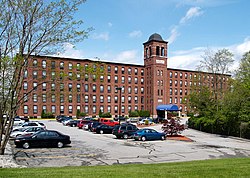
The Wilcox, Crittenden Mill, also known as Wilcox, Crittenden Mill Historic District, is a 17-acre (6.9 ha) property in Middletown, Connecticut that was listed on the National Register of Historic Places in 1986. It was the location of the Wilcox, Crittenden company, a marine hardware firm. The historic district listing included four contributing buildings and three other contributing sites.

Bourne Mill is an historic textile mill on the border between Tiverton, Rhode Island and Fall River, Massachusetts.
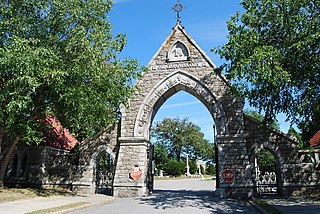
Oak Grove Cemetery is a historic cemetery located at 765 Prospect Street in Fall River, Massachusetts. It was established in 1855 and greatly improved upon in the years that followed. It features Gothic Revival elements, including an elaborate entrance arch constructed of locally quarried Fall River granite. The cemetery originally contained 47 acres, but has since been expanded to over 120 acres. The cemetery is the city's most significant, built in the planned rural-garden style of Mount Auburn Cemetery in Cambridge, Massachusetts. It was designed and laid out by local architect Josiah Brown, who is also known for his designs of early mills including the Union, Border City, and others.

Mill Conversion or mill rehab is a form of adaptive reuse in which a historic mill or industrial factory building is restored or rehabilitated into another use, such as residential housing, retail shops, office, or a mix of these non-industrial elements (mixed-use).

The Metacomet Mill, built in 1847 by Colonel Richard Borden for the manufacture of cotton textiles, is the oldest remaining textile mill in Fall River, Massachusetts.

Narragansett Mills is an historic textile mill site located at 1567 North Main Street in Fall River, Massachusetts, United States. Built in 1872, it is a well-preserved example of a brick mill complex, somewhat unusual in a city where most of the mills are stone. It was listed on the National Register of Historic Places in 1983.

The Algonquin Printing Co. is a historic industrial complex at 1 Middle Street, off Bay Street in Fall River, Massachusetts. Developed beginning in 1891, it was the last 19th-century printing operation to be established in the city. The surviving main building was built in 1902, and the company operated on this site until 1941. It was listed on the National Register of Historic Places in 1983.

Durfee Mills is an historic textile mill complex located at 359-479 Pleasant Street in Fall River, Massachusetts, USA. Developed between 1866 and 1904, it was during its period of development the city's largest and architecturally finest mill complex. Along with the adjacent Union Mills, it is occupied by numerous retail businesses and a restaurant, and is known as the Durfee-Union Mills. The complex was listed on the National Register of Historic Places in 1983.
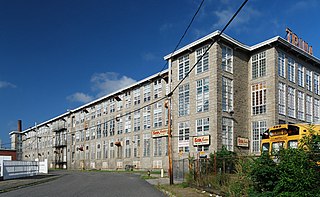
Sagamore Mills No. 1 and No. 3 are two historic textile mills on Ace Street in Fall River, Massachusetts. Built in 1888 and 1908, they form part of one of the city's single largest textile operations of the late 19th century. Mills No. 1 and 3 were added to the National Register of Historic Places in 1983, with a separate listing for Mill No. 2, located nearby on North Main Street.

The Old Colony Iron Works-Nemasket Mills Complex is a historic industrial site located on Old Colony Avenue in the East Taunton section of Taunton, Massachusetts, United States, adjacent to the Taunton River at the Raynham town line. The site was first occupied by the Old Colony Iron Company, which had originally been established in the 1820s as Horatio Leonard & Company. The western part of the complex was sold to Nemasket Mills in 1889. The eastern part was acquired by the Standard Oil Cloth Company. The site was added to the National Register of Historic Places in 1984.

The Cohannet Mill No. 3 is an historic textile mill located at 120 Ingell Street in Taunton, Massachusetts. The mill was built in 1890 and added to the National Register of Historic Places in 2006. It is the only remaining mill of the Cohannet Mills company, founded in 1847 for the manufacture of fine cotton yarns.

Cornell Mills is an historic cotton textile mill on Alden Street in Fall River, Massachusetts. Built in 1890, it is a well-preserved example of late 19th-century industrial mill architecture in stone. The mill complex was added to the National Register of Historic Places in 1983. On February 26, 2016, a developer has bought the property with the intent to convert the mill into middle-class residential housing.
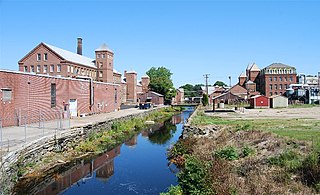
The Reed and Barton Complex is an historic industrial complex at West Brittania and Danforth Streets in Taunton, Massachusetts. It is the site of one of Taunton's first and largest industries, now known as Reed & Barton, a privately held silversmithing business that operated from 1824 to 2015. The company's success was instrumental in Taunton becoming known as the "Silver City". The complex was listed on the National Register of Historic Places in 1984.
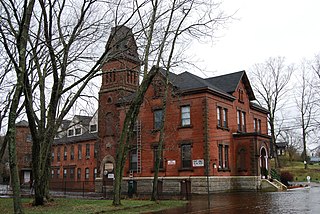
The Albert Field Tack Company is a historic industrial site located at 19 Spring Street in Taunton, Massachusetts, next to the Mill River. Built in 1868 for a company founded in the 1820s to manufacture fasteners, the main office building is an unusually high-style building given its industrial setting. It was added to the National Register of Historic Places in 1984. It has since been converted into apartments.

Border City Mills is an historic textile mill site located at the corner of West Street and Weaver Street in Fall River, Massachusetts.
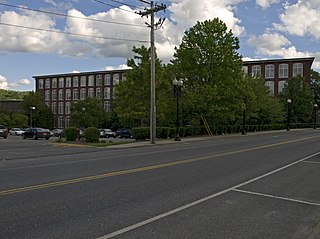
The Berkshire Mill No. 1 is a historic mill complex on Hoosac Street in the center of Adams, Massachusetts. Built in 1895 by the locally prominent Plunkett family, it is an important surviving reminder of the town's industrial textile past. Now converted into mixed residential and commercial use, it was listed on the National Register of Historic Places in 1982.
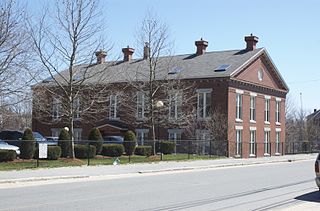
The Colburn School is a historic former school building at 136 Lawrence Street in Lowell, Massachusetts, USA. Built in 1848, it is a fine example of institutional Greek Revival architecture, and is one of the city's older surviving school buildings, built during the rapid population growth that followed the city's industrialization. Now converted to apartments, it was listed on the National Register of Historic Places in 1995.

Josiah Brown (1816–1875) was an architect and civil and mill engineer of Fall River, Massachusetts. Among his major surviving projects are the Union Mill No. 1 (1859) and Border City Mill No. 2 (1873), both in Fall River.

Tecumseh Mill No. 1 is a historic cotton mill located at 164 Hartwell Street in Fall River, Massachusetts. It was built in 1866, and added to the National Register of Historic Places in 1983 as part of the Corky Row Historic District. Tecumseh Mills No. 2 and No. 3 were located nearby on Plymouth Avenue, but have since been demolished.

The Boston Finishing Works is a historic industrial factory complex at 160 Water Street in Williamstown, Massachusetts. The site was developed industrially beginning in 1873, and was in regular use until 2000 as one of the town's major industrial employers. It was listed on the National Register of Historic Places in 2016.
